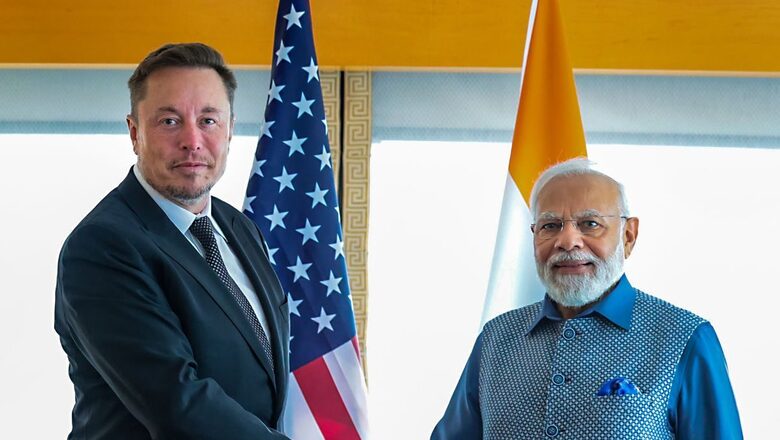
views
Experts have slammed as “baseless” Chinese claims that India’s electric vehicles sector is facing several challenges. This comes amid the news of Tesla CEO Elon Musk’s visit to the country, following which reports emerged that the American carmaker will send a team to scout locations for a proposed car plant worth $2 billion to $3 billion.
Musk is set to meet Prime Minister Narendra Modi this week. After these announcements and reports, however, a Chinese media outlet on social media shared a video of a senior fellow at Beijing-based Taihe Institute, Charles Liu, who questioned this move putting forward several challenges related to India’s EV sector.
Highlighted in the social media post, these claims include: “Lack of supply chain and infra, lack of skilled engineers and workers, and negative business environment.”
What are the claims, and facts?
In the video, Liu says: “Tesla, the electric vehicle innovator has announced that it is sending a team to India to select the site for a factory to be built in India, probably a couple of billion dollars project. Now this is interesting in many ways. Number one, I am not very optimistic about manufacturing electric vehicles in India efficiently, and effectively, for the simple reason that there is no supply chain in India. There is very poor infrastructure in India.”
News18 reached out to some EV companies to understand the facts behind such claims. Some industry insiders, without paying much attention to the arguments, called them “baseless”.
One of the industry insiders, Sanjay Gupta, chief development officer and global head of engineering at L&T Semiconductor Technologies, while expressing his disagreement said the person is only indicating the kind of losing ground that China is having against India, and Apple’s success in India proves it.
“India’s infrastructure is improving rapidly, with airports and roads surpassing past achievements. We’re now exporting electronics and leading in satellite launches. Biased comments ignore India’s potential and fear its rise. India’s democratic, transparent policies contrast China’s. So those views are incorrect,” he said.
However, in the video, the person then claims that India’s business environment is unfavourable, and it is not only for Chinese companies but also for American and European firms.
“If you see how they treated foreign companies in India, you will see… all kinds of charges, all kinds of fraudulent cases against foreign companies, hundreds of billions of dollars in fines, if not billions,” Liu says.
He continued by highlighting China’s better infrastructure and supply chain. Moreover, he said India’s human capital for advanced manufacturing is lacking compared to China’s, which has invested in skilled workers and engineers for several decades.
“Unfortunately, I don’t think that is available in India. Again, that is something that takes decades to build,” says the Chinese expert.
In response to these claims, Gupta said if India did not have the right business environment, then why would numerous foreign companies, from all sectors, express their interest in investing in the country? Why would Apple take a risk manufacturing its latest phones in India?
In terms of fines and cases, he said: “India’s judicial system ensures fair treatment, addressing conflicts impartially. Instances of tax evasion or other types of wrongdoing are not tolerated, showcasing India’s commitment to a transparent business environment.”
Gupta highlighted India’s robust skilling programmes with a focus on all cutting-edge technologies, and said: “We may not be the top nation in skilling at the moment, but the country is at the right pace in grooming a skilled workforce to position itself as a global talent hub.”
“I think he doesn’t know that India’s young population will remain the youngest for the next 40 years. While China’s own population is declining at a pace where they will require skilled people from India very soon,” he added.
Nikhil Kamath, the co-founder of Zerodha, shared a post on social media highlighting India’s EV landscape. While sharing an analysis he wrote: “Increase in EV sales highlights a shift towards more sustainable economic growth and technological innovation. Considering the current price points of EVs & number of options available, the sales figures might seem modest, but they are actually impressive.”
According to the data shared in his post, while India’s EV sales only accounted for 1.7 per cent of total car sales in 2023, the graph shared by Kamath included a text box highlighting that Indian EV car sales grew by 170 per cent in 2022 and 120 per cent in 2023. The image also stated that the Indian government is targeting 30 per cent EV adoption by 2030, which is a positive indicator for the future of electric vehicles in India.
Another infographic image pointed out the data about EV sales in 2022. It showed that in terms of sales of electric two-wheelers, India has placed itself in the fourth position with 4 per cent, behind China (47 per cent), Vietnam (10 per cent) and Europe (8 per cent). But, when it comes to electric three-wheelers, India has taken the lead with 55 per cent, that is significantly higher than China (22 per cent).
















Comments
0 comment